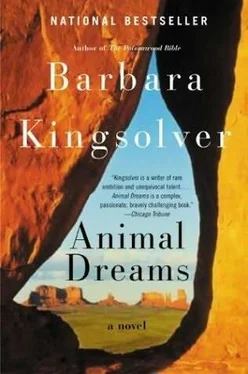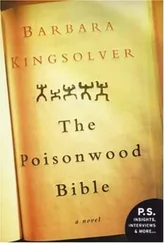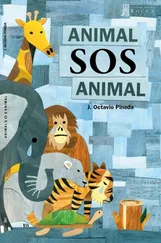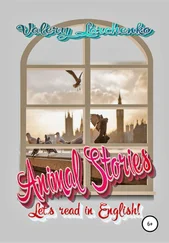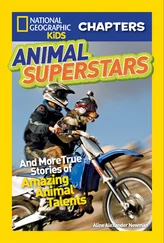Ten seconds later he let me off at the base of the path up to Loyd’s house. Loyd was sitting outside, drinking coffee under the huge mesquite that shaded his front yard. He was just out of the shower, wearing only a pair of soft gray sweatpants. His damp hair lay loose on his shoulders. He looked very happy to see me but also unsurprised; typical, maddening Loyd. Jack betrayed excitement in his thumping tail, but Loyd made no sudden movements. He let me come to him, bend over to kiss him, sit down in the chair beside him. I was oddly conscious of his skill with animals.
“You want coffee?”
“No thanks.”
He sat looking at me, smiling, waiting.
“Guess what,” I said finally, handing him the letter. He read it, grinning broadly.
“It doesn’t mean anything,” I said. “I still can’t stay.”
“It does mean something. It means they want you, whether you stay or not. It means you’re real good at what you do.”
I took the letter back and looked at it, not at the words but the object itself. “I guess you’re right,” I said. “I don’t think anybody ever told me that before. Not in a letter. I guess that’s something.”
“Sure it is.”
“I was thinking of it as just one more choice I’d have to make. A complication.”
“Life’s a complication.”
“Sure,” I said. “Death is probably a piece of cake by comparison.”
We looked at each other for a while. “So tell me about your day, honey,” I finally said. We both laughed at that.
“Another buck in the bank, doll.”
“Is that it? Do you like driving trains? You never talk about it.”
“You really want to hear about it?”
“I think so.”
“Okay. Yeah, I like driving trains. Today I went out on a dog catch.”
“Not the Amtrak?”
“No. A special mission.”
“You had to catch a dog?”
“A dog catch is when you go out to bring in a train after the crew’s died on the main line.”
“The whole crew died?” I was visited by the unwelcome thought of Fenton Lee in his sheared-off engine, after the head-on collision. I knew this couldn’t be what Loyd meant.
He smiled. “Died on the hours-of-service law. They’d worked a full twelve hours but there were holdups somewhere and they still hadn’t gotten to a tie-up point. You can’t work more than twelve hours straight because you’d be tired and it would be dangerous; it’s federal law. So you just stop where you are, and wait for a relief crew.”
“Good thing airline pilots don’t do that,” I said.
“I bet they go to sleep at the wheel more than we do, too.” Loyd said.
“So you went out and caught the dog.”
“Me and another engineer and a conductor and a brakeman all deadheaded out to Dragoon to pick up the train. The dead crew came back to Grace in a car.”
“And you, what, took the train on into Tucson?”
“Yep.”
“So what does that mean, what do you do exactly? Is there a steering wheel?”
He laughed. “No. You adjust throttles, you set brakes, you watch signals. You use your head. Today I had to use my head. I was the lead engineer and it was a real heavy train, over ten thousand tons. There were two helper engines coupled at the rear of the train.”
“Ten thousand tons?”
He nodded. “A little better than a mile and a half long.”
“And you’re in the front engine, and there’s two engines pushing on the back?”
“Yep. The hard part was topping over Dragoon. That’s a real long hill, a long descending grade from Dragoon to the Benson bridge, and there’s a siding you sometimes have to pull into there, at twenty-five miles an hour. But the train is so damn heavy it wants to take off on you down that hill. I’ve messed up on that hill a bunch of times before. Just between you and me, one time I went flying through there at sixty, hoping to God there was nobody coming on the main line. I never could have gotten into the siding track.”
“I guess there was nobody coming.”
“No. But today there was, and I got us in safe and sound. Today I did it exactly right.” He smiled at me over his coffee cup.
“So tell me about it.”
“Well, we topped over the hill way below the speed limit, and when I got about half the train over the hill I set a minimum amount of air brakes. Then I waited for it to take hold. The brakes take hold all along the train, in every car, front to back. And then I just watched the speedometer keep coming up.”
“You’re still speeding up? Even after you’ve set the brake?”
“You’ve got six thousand tons and a mile of train coming down the hill behind you. What do you think it’s going to do?”
Doc Homer used to pose puzzles like this to Hallie and me, to develop our cognitive skills. “But you’ve also got some-odd thousand tons still coming up the hill behind you.”
“That’s right. A little less coming up, and a little more coming down, every minute. That’s the tricky part. That’s the Zen of Southern Pacific.”
I was extremely impressed.
“On a normal train you’d be real leery of setting the brake while half your train’s still coming up the hill. The rear would start pulling backward and you’d break in two.”
“Oh,” I said. “So then you’d have two trains.”
“Then you’d have a nice long vacation without a paycheck.”
“Oh.”
“But I had helper engines that could push on me from the back, so I was pretty sure we wouldn’t break in two. I radioed my helper engineer back there to keep pushing up the hill at full throttle, that’s throttle eight, and then cut it back to throttle one when he topped over.”
“So he was pushing and you were braking at the same time.”
“Yep. Setting the brake early enough, that was the part I never got before. It kind of goes against what you think’s right.”
“Nobody can just tell you how to do that hill?”
“No, because every train’s different on every hill. Every single run is a brand-new job. You have to learn the feel of it.”
“So you can’t necessarily do the same thing next time?”
“Not exactly the same thing, no. But on this train the minimum set worked perfect. And then I worked the throttle to maintain forty miles an hour. I came down the hill through Sybil and Fenner, the last siding before the Benson bridge. I got a flashing yellow after Sybil so I knew we’d probably have to go into Fenner. Then we went by a yellow, and the next signal was a diverging approach, a red over yellow, and I had to be down to twenty-five at that signal so we could get into the siding. Sure enough, there was a train on the main line headed east.”
“What if you’d been going sixty, like last time?”
He winked. “I wouldn’t be getting any nice letters telling me how good I am at my job.”
“Seriously. What if you saw a headlight coming at you in the dark?”
“You heard about Fenton Lee, then, did you?”
“What would you do?”
Loyd looked at me. “Jump off.”
“Yeah?”
“Oh, yeah. I did it one time already, when I was a fireman. The engineer hit a siding too fast and that sucker looked like it was going off the track. I was out of there like buckshot. I got a big old bruise on my butt, and the guys laughed at me because they didn’t derail. I don’t care. There’s things worth risking your life for, but a hunk of metal’s not one of them.”
I watched him drink his coffee. In the hot sun his hair had dried to its normal glossy, animal black. The mesquite leaves cast feathery shadows all over his face and the muscular slope of his chest. The sight of his bare feet stirred me oddly. I badly wanted to take him inside to bed.
“Well. But you are real good at your job,” I said.
Читать дальше
